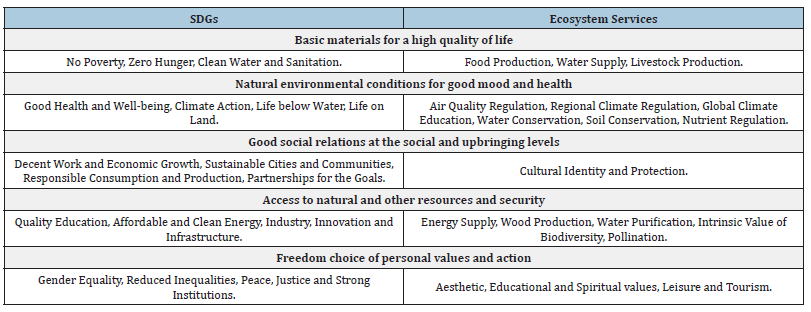- Submissions

Full Text
Environmental Analysis & Ecology Studies
Sustainable Development from the Perspective of the Supply and Demand for Ecosystem Services
Huangwei Deng* and Liao Zhenliang
College of Environmental Science and Engineering, Tongji University, China
*Corresponding author:Huangwei Deng, College of Environmental Science and Engineering, Tongji University, China
Submission: May 08, 2023; Published: May 17, 2023

ISSN 2578-0336 Volume11 Issue1
Abstract
Sustainable Development (SD) aims to strengthen human welfare. “The 2030 Agenda for Sustainable Development” announced 17 Sustainable Development Goals (SDGs) to improve human lives. The ecosystem services provide ecological functions for human and the relationship between the supply and demand of ecosystem services indicated the balance between the ecology and the economy. This article emphasized the necessity of balancing the supply and demand of ecosystem services regarding the promotion of SD to increase human welfare.
Keywords:Ecosystem services; Sustainable development; Human welfare; Supply and demand
Introduction
The Sustainable Development (SD) was proposed to promote the balance among the economy, society and environment to increase human welfare. To call for the peace for the planet and the provision of human welfare, “The 2030 Agenda for Sustainable Development” put forward 17 Sustainable Development Goals (SDGs) to guide SD [1]. The evaluation of human welfare is mainly based on Human Development Index (HDI) [2], Genuine Progress Indicator (GPI) [3], and Index of Sustainable Economic Welfare (ISEW). However, they lack the discussions on the linkages between SD and the supply and demand of ecosystem services. Ecosystem service was first proposed by Holden and Ehrlich in 1974 and defined by the Millennium Ecosystem Assessment as the benefits provided by ecosystems to humans [4]. The mismatching of the supply and demand of ecosystem services indicates the mismatching of the protection of the ecology and the development of the economy and the society, illustrating that the 17 SDGs have not yet been met. To promote SD and increase human welfare, we should keep the surplus of ecosystem services to ensure the sustainable ecological functions.
The Linkages Between SD and Ecosystem Services
The author listed the relative linkages between the SDGs and ecosystem services regarding their values on providing human welfare, as Table 1 shown.
Table 1:The relative linkages between the SDGs and ecosystem services.

Suggestions on SD Promotion from the Perspective of Ecosystem Services
Regarding the supply of ecosystem services, to ascertain the increasing human welfare, apart from the SDGs which are contained in the basic materials for a high quality of life, the SDGs such as gender quality and quality education are the necessities. Considering the demand for ecosystem services, both of the natural values of the environment and the artificial values of the society and the economy should be accessed, indicating that the promotion of SD should take the stakeholders of ecosystem services into consideration. From the perspective of the supply and demand of ecosystem services, the relative relationship between the supply and demand of ecosystem services illustrates the availability and actual assess to human welfare from the ecology. It can be used to evaluate the degree of sustainable human welfare. So, the government can use the supply and demand of ecosystem services to evaluate regional SD and come out practical actions for SD promotion.
References
- United Nations (2015) Transforming our world: The 2030 agenda for sustainable development, Resolution adopted by the General Assembly on 25 September 2015, General Assembly.
- Yero EJ, Sacco NC, Nicoletti MC (2021) Effect of the municipal human development index on the results of the 2018 Brazilian presidential elections. Expert Systems with Applications 168: 114305.
- Andrade DC, Garcia JR (2015) Estimating the genuine progress indicator (GPI) for Brazil from 1970 to 2010. Ecological Economics 118: 49-56.
- Millennium Ecosystem Assessment (2005) Ecosystems and human well-being: Synthesis. Island Press, Washington DC, USA.
© 2023 © Huangwei Deng. This is an open access article distributed under the terms of the Creative Commons Attribution License , which permits unrestricted use, distribution, and build upon your work non-commercially.
 a Creative Commons Attribution 4.0 International License. Based on a work at www.crimsonpublishers.com.
Best viewed in
a Creative Commons Attribution 4.0 International License. Based on a work at www.crimsonpublishers.com.
Best viewed in 







.jpg)






























 Editorial Board Registrations
Editorial Board Registrations Submit your Article
Submit your Article Refer a Friend
Refer a Friend Advertise With Us
Advertise With Us
.jpg)






.jpg)














.bmp)
.jpg)
.png)
.jpg)










.jpg)






.png)

.png)



.png)






